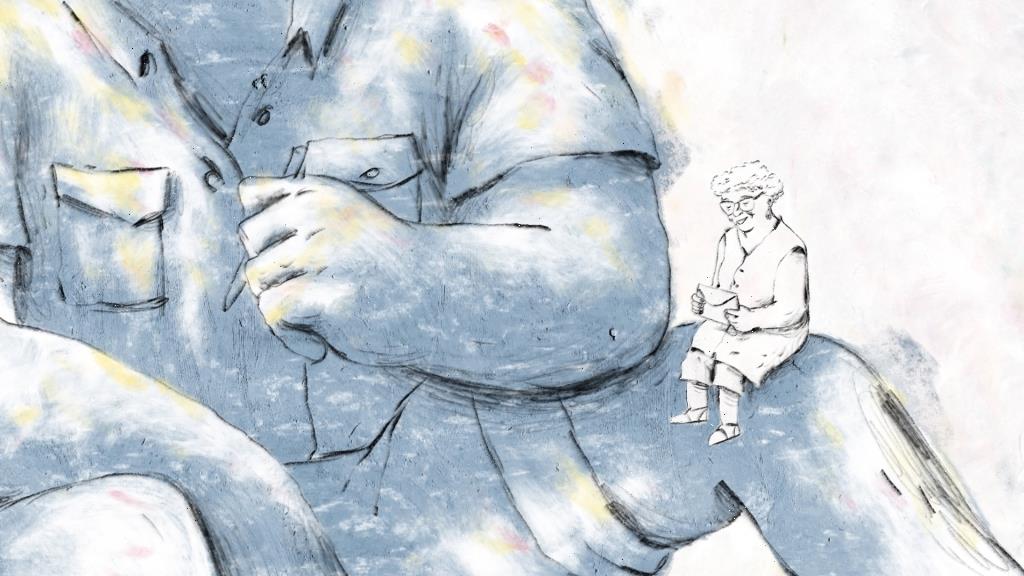Filmmaker Laura Gonçalves had the idea for an animated short for a few years, stemming from discussions of her uncle whenever she sees her family at a reunion. The Garbage Man (O Homen do Lixo) takes place at the dinner table, as the family gathers to remember Uncle Botão, a garbage man who lived through the Colonial War and emigrated from Portugal to France. Gonçalves was young when her uncle passed away, so she only heard stories about him around the dinner table. For the film, she dove deeper with her family and got a more personal insight into who he was.
DEADLINE: Where did the idea for The Garbage Man come from?
Related Story
'Marcel The Shell With Shoes On' Director Dean Fleischer Camp On Using A "Non-Fiction Approach With A Fictional Character"
LAURA GONÇALVES: It was an idea that I developed for a few years before I started making the film. The first thing that I wanted was to record my family talking about their memories of my uncle, because it’s something that we do every time the family comes together. So, I really wanted to represent that moment that is part of our reunions. And then secondly, my uncle had this really interesting path that also represents so many thousands of people that went through the same moment – from growing up during the dictatorship, going to war, immigrating illegally from Portugal to France… thousands of people went through these same moments in the history of our country. Even though it’s personal, it’s also telling the story of a lot of people. So, in the film, I wanted to talk about those moments that we don’t really talk about at the table that much, but I thought that it was really important to have them in the film. Also, because I think that somehow it represents the person that he becomes after that. He became this really exuberant person, living life to the fullest.
DEADLINE: When you were talking to your family members and diving deeper into some of these things, was there anything you found out that surprised you?
GONÇALVES: Oh, yes, there was. Part of it was also because I was quite young when he died, and my cousins are all a lot older than me. There was a lot of history that I didn’t know, and especially I didn’t ask about the war, ever. It’s something that we don’t really speak about in Portugal, the war in Angola. I thought that it was really important to ask in the film, and I wasn’t really sure what I was going to hear. I knew that no one knew anything about it or almost anything. Most of the things that people talk about during the war are usually funny stories that happened while they weren’t fighting. It was a very stupid war, everyone hates it, and the thing that I got to learn was how ignorant people here were of what was going on there, and how they missed the people there and the censorship that didn’t really allow them to talk about it. So, it was a surprise in the way that the war and the immigration wasn’t something that I really knew that much about and I only found out when I was making the film.
DEADLINE: Where did the idea for the guitar music come from?
GONÇALVES: The music is very important to the film because of my cousins, the sons and daughters of my uncle. They all live in different parts of France, and they all meet here in Belmont. And when they meet, they play together. They have a band, each one plays an instrument. I had this memory of a summer that we were there all together and being there in the garage while they were playing. There were kids in the pool, the men were doing the barbecue, the women were doing the cooking, and it’s this very beautiful summer memory that I really wanted to put in the film.
So, I recorded them playing, and the base of the music was given to the musician, Ricardo Santos Rocha. I knew that he was very versatile and he worked with all of these instruments. He can play everything, and that was very important for the film because I didn’t want a band to be playing. So, the creation of the music was based on my cousins playing, but it was Ricardo that wrote the music for all of the moments. I knew that I wanted the guitar as a base, because the guitar is following from the beginning until the end. So, you see it’s also in France and the garbage, and my uncle brings it back to the present. So, a lot of the sound is very guitar based. Also, another thing about Ricardo that is really interesting is that he goes to the secondhand market, and he gets instruments that are not working anymore, and he actually fixes them and he plays them. It was something that I always really liked about his work. It was that recycling and bringing life back to the instruments that people throw away.
Must Read Stories
‘The Way Of Water’ To Hit $1B Overseas Today As Global Cume Tops $1.44B
‘MNF’ Game Won’t Be Resumed This Week; Bills Player Still Critical After CPR On Field
Kevin McCarthy Fails To Secure House Speakership After Historic Third Ballot
International Chief Superna Kalle Exiting; Darren Nielson Promoted To Post
Read More About:
Source: Read Full Article











